Exploring 4 different CCK types: Children of Immigrants, Children of Refugees, Children of Marginalized and Privileged Minorities
What is a Cross-Cultural Kid?
A Cross-Cultural Kid (CCK) is someone who has been significantly influenced by two or more cultural environments during their developmental years. The CCK Model is the work and research of Ruth Van Reken.
Welcome to part 4 of the CULTURAL MOSAICS series where we closely look at the Cross-Cultural Kids (CCK) Model by Ruth Van Reken, analyzing each category more in depth, going well beyond the realm of Third Culture Kids, where it originated.
This CULTURAL MOSAICS series on Cross-Cultural Kids (CCKs) was originally posted on Instagram in September 2023 as a collaborative project by Beatriz Nour @inbetweenish.pod and myself, Wiebke Homborg @chameleon_coaching. If you have Instagram, we encourage you to check out the original posts for its great visuals, audios, reels and storytelling.
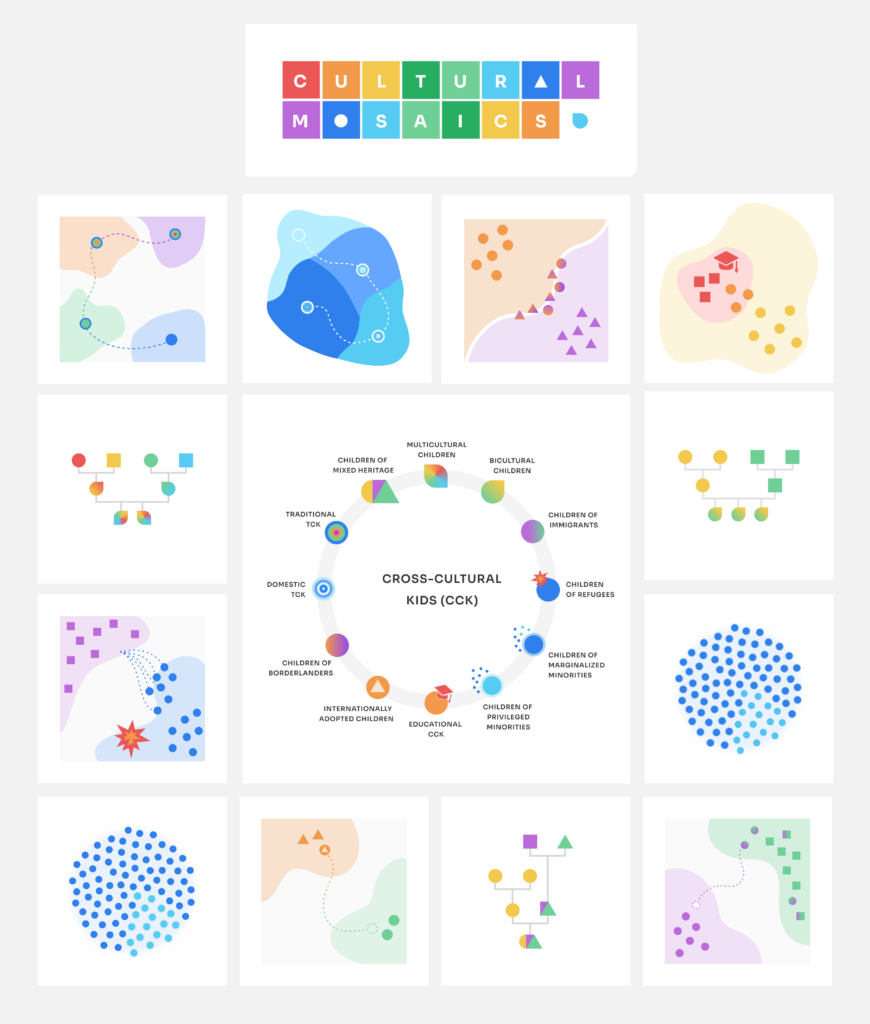
In this article, we introduce the following CCK types:
- CHILDREN OF IMMIGRANTS
- CHILDREN OF REFUGEES
- CHILDREN OF MARGINALIZED MINORITIES
- CHILDREN OF PRIVILEGED MINORITIES
For a general introduction to CCKs, check out part 1 of this blog post series.
For more details on other CCK types, go to part 2 and part 3.
Explore how you can be a genuine mix of several types in part 5.
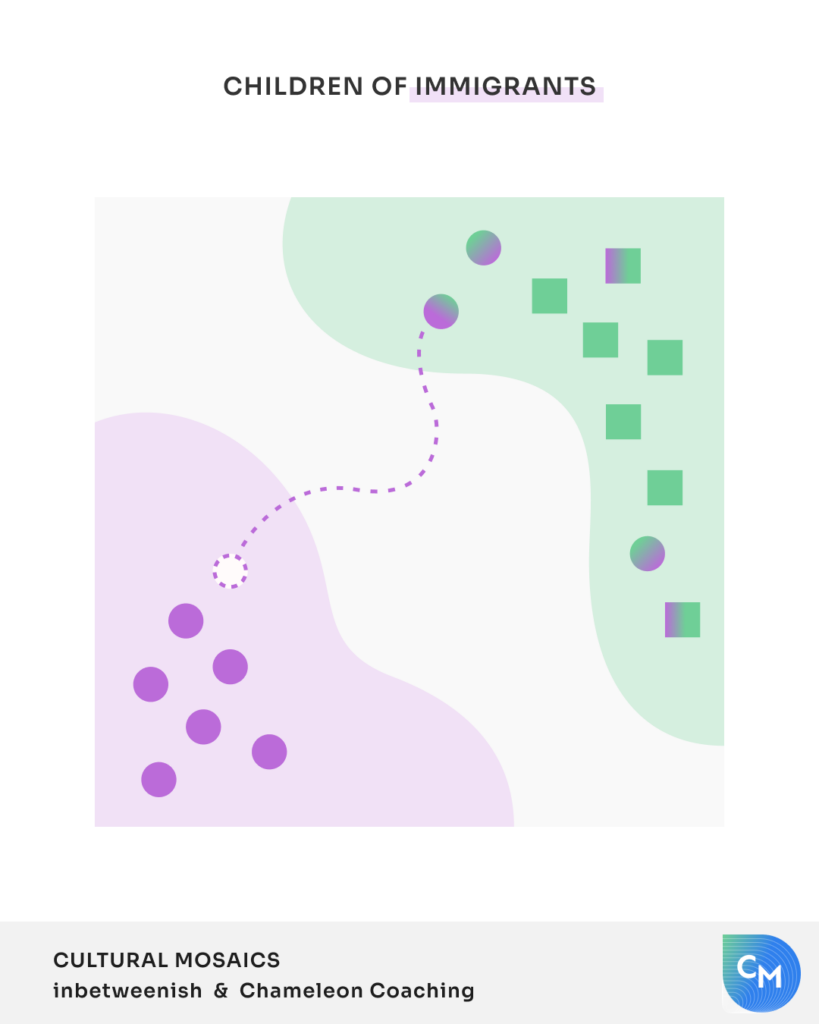
Children of Immigrants
Definition
Children of immigrants are children whose parents have made a permanent move to a new country, and eventually seek naturalization. These children grow up with a dual cultural identity, influenced by the culture of their parents’ home country and the culture of the country they are raised in.
Examples: Elon Musk, Charlize Theron
Unique experiences, benefits and challenges
There are a number of factors that may greatly impact the experience of permanently immigrating to a new country and some of these factors are: reason for immigration, proficiency in language, network in host country, financial situation, job opportunities available to immigrants, etc. These factors also shape the experiences of children of immigrants, who may have one immigrant parent or both immigrant parents.
Children of immigrants often have the advantage of being bilingual or multilingual, a valuable asset in a globalized world. They bring diverse perspectives and cross-cultural competence that enrich the cultural fabric of their countries. They’re resilient, adaptable, and adept at navigating change. Often times they vacation in their parents’ home country(ies) during holidays and maintain connection with their roots through their network, grandparents, and extended family.
“Born in Côte d’Ivoire, came here when I was one. Heathrow Airport was the place where my first steps were.”
On the other hand, they may grapple with identity confusion, balancing multiple cultural identities and trying to appease their parents’ cultural expectations. They may also face discrimination or biases based on their ethnic or cultural background which can impact their self-esteem and social integration. Sometimes they take on a disproportionate role of translator/organizer in their family unit. Children of immigrants often feel an immense pressure to succeed academically and professionally as a way to validate their immigrant parents’ sacrifices.
What parents can do
Children of immigrants can be supported through inclusive educational programs and teaching methods. It’s important for them to have access to cultural resources, where they can maintain a relationship with their parents’ culture but also integrate into their host country. Initiatives promoting diversity and inclusion help them embrace their unique identities and help them become better contributors to society as they feel more accepted.
Think about it
- In what ways are immigrant children code-switching between two cultures on a daily basis?
- What can schools & communities do to help children of immigrants feel more accepted and included?
- What preconceptions might you have about immigrants in your country?
Podcast Recommendation
the inbetweenish pod, episode “🎹 it is not with bones and skin, it’s all with feeling — with Axel [Part I]”.
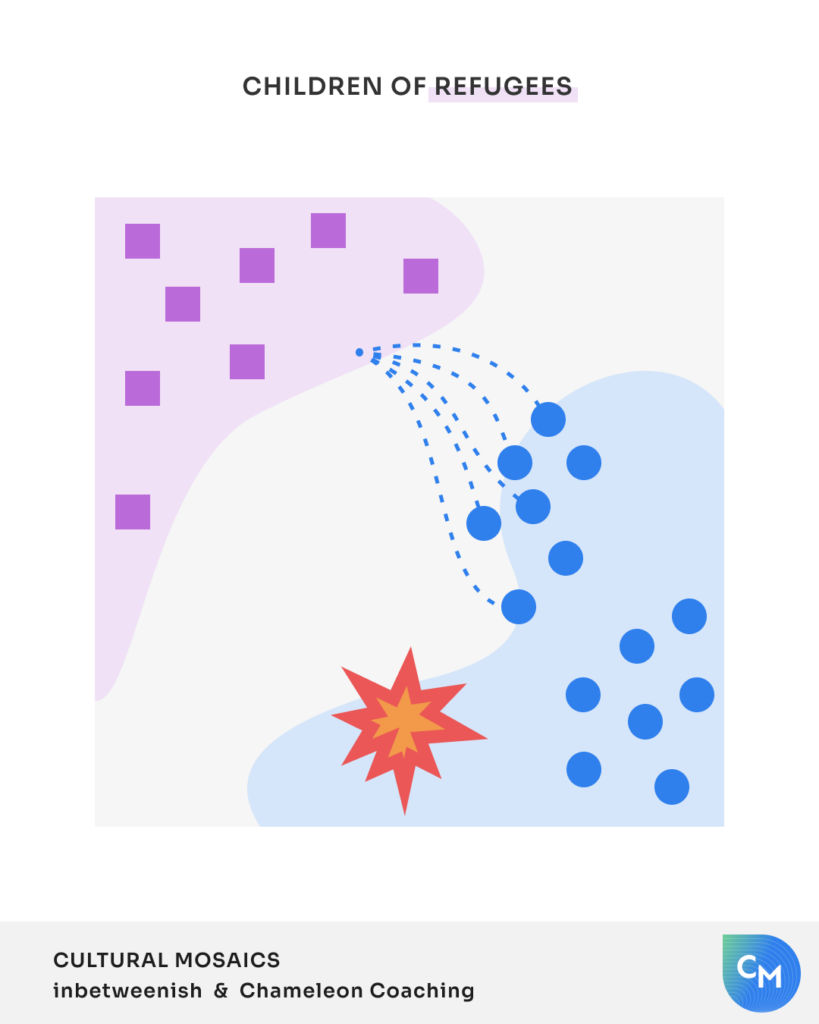
Children of Refugees
Definition
Children of refugees refers to individuals who are born to parents who have sought refuge in another country due to persecution, violence, conflict, or other forms of adversity in their home country.
These children often grow up in a different cultural context than their parents or grandparents, resulting in a unique blend of cultural influences and challenges.
Examples: Rita Ora, Mo Amer
Unique experiences, benefits and challenges
Children of refugees often develop resilience, empathy, and a strong sense of cultural awareness due to their families’ experiences.
“It was a very hopeless situation, you had no way of knowing whether you were going to be resettled anywhere or were you just going to be in this limbo…”
Unfortunately, many of these children have experienced trauma in their home countries, during their journeys across countries, seeking asylum, or upon arrival in the host country. They may face language barriers, acculturation stress, discrimination, and integration challenges. These factors can significantly impact their mental health and academic performance.
What we can do to support children of refugees
Schools and communities, while well-intentioned, often lack the necessary resources to adequately support refugee children. There is a need for cultural awareness programs, trauma-informed counseling, language assistance, and mentorship initiatives to foster a sense of belonging, integration, and focus on language skill development.
Educators should grasp the impact of trauma and cultural adjustment on students’ performance and encourage empathy among classmates. Each refugee child offers unique skills and knowledge. Teachers should model inclusion, integration, and cultural sharing to help them maintain their identity and nurture a diverse learning environment.
In the past decade, the global number of refugees has more than doubled, and nearly half of them are children. These children and their families need global solidarity and support to ensure they have access to essential services like education, healthcare, social protection, and helping them rebuild their lives with dignity and hope.
Think about it
- How can we ensure that children of refugees feel safe and welcome in our community or school?
- What resources and programs have been implemented in your community to address the unique challenges and needs of children of refugees?
Podcast Recommendation
the inbetweenish pod, episode “🌳 notions of home — with Baharak”
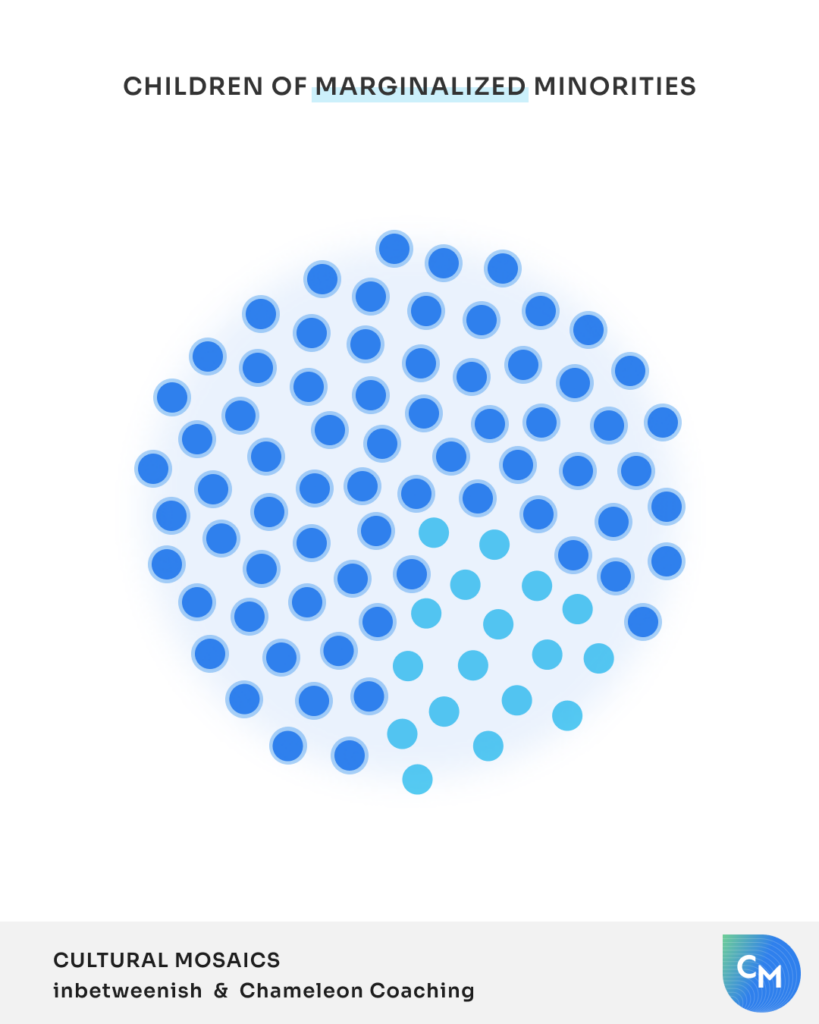
Children of Marginalized Minorities
Definition
Marginalized minorities refer to groups of people who experience systematic social, economic, or political disadvantages and are often excluded or disadvantaged by mainstream society.
They face discrimination, oppression, and limited access to resources and opportunities.
Examples: Rohingya in Myanmar, Sami in Scandinavia, Roma in Europe.
Unique experiences, benefits and challenges
Children of marginalized minorities often have diverse experiences that depend on their environment. Some may grow up without realizing they belong to a minority group, especially when they live in close-knit subcultures with little interaction with the majority.
Conversely, some are acutely aware of their differences from a young age, navigating two worlds shaped by religion, ethnicity, or other factors. These children, growing up between two worlds, bring a wealth of diversity to their communities. Their unique position often serves as a bridge. They have greater empathy for other marginalized groups in society and are more accepting of differences and different points of view.
In general, these children face a dual challenge: discrimination, often systemic, and marginalization. Some families and societies foster an ‘us vs. them’ sentiment, creating a divide between the minority and majority groups. This can result in disparities in education, job opportunities, and housing options for marginalized families. It can even go as far as to impact interfaith, intercultural or interracial marriages.
“Oh you’re Christian? My mother told me not to speak to those.”
Unfortunately, marginalized groups often encounter a higher risk of abuse, violence, exploitation, and human rights violations. These experiences profoundly shape their identity and can lead to self-esteem issues, internalized racism, and mental health struggles.
Yet, children of marginalized minorities also bring richness and diversity to their communities. They often master the art of code-switching, seamlessly moving between languages, contexts, and cultures. They are, in essence, cultural chameleons.
What parents can do
Parents can support their children by engaging in open conversations about their experiences, providing comfort, and celebrating cultural strengths. Encouraging critical thinking and highlighting positive collaborations between minority and majority groups are equally important. It’s crucial for schools, communities, and institutions to recognize the dynamics of marginalization and validate people’s lived experiences.
Think about it
- Which minority groups live within your country?
- What beliefs do you have about these minority groups?
- Who or what has instilled this belief in you?
Podcast Recommendation
This CCK type is one of the least talked about categories in this model. But it’s so important to highlight and understand because minorities exist in almost all societies. Beatriz and Wiebke talked extensively about the minority experience. Sometimes it can be tricky to talk about being part of a marginalized minority without entering the victim mindset. It took many calls and discussions before Beatriz finally agreed to share a very personal micro-moment that happened to her when she was only 6 years old. Head over to Instagram to listen to her micromoment.
If you want to hear more about Beatriz’ multicultural upbringing you can tune this “🐘 identity crisis: who am I? — about your host”

Children of Privileged Minorities
Definition
Privileged minorities are groups of people who, despite being considered minorities in terms of numerical representation, possess social, economic, or political advantages in society.
These advantages are typically derived from factors such as wealth, education, social status, or historical and systemic advantages.
Examples for historically privileged minorities: Brahmins in India, White South Africans, Emirati in the United Arab Emirates.
Unique experiences, benefits and challenges
Growing up as a child of a privileged minority can be tricky to maneuver, especially as many people don’t realize that they are in fact privileged until they leave their bubble. They may sometimes be culturally influenced by the majority, but that is not always the case.
It’s important to remember that privilege is a nuanced topic, it’s not black and white, depending on various factors such as the nature of the privilege, the child’s upbringing, and their exposure to diversity. We also want to point out that while you may be privileged in certain areas, like the socio-economic class you belong to, or colorism, you may also face discrimination in different aspects.
Here are some of the benefits and challenges:
Growing up in a privileged minority group can offer several advantages to children. They often have better access to quality education, healthcare, and extracurricular activities, contributing to their overall development and success. This access can boost their confidence and self-esteem, as they feel supported and encouraged in pursuing their goals.
“I went to school with [xzy]. He would be great for this leadership position.”
Privileged children may also have opportunities to explore a wide range of interests and hobbies, helping them discover their talents and passions. Exposure to influential community members can provide valuable networking opportunities, which may prove beneficial later in life. Moreover, they may develop a strong sense of cultural identity and pride, benefiting from access to cultural preservation efforts and resources.
However, there are potential downsides to growing up privileged in a minority group. These children may have limited exposure to the challenges faced by less privileged groups, leading to a lack of awareness and empathy for social inequalities. Some may develop a sense of entitlement, expecting special treatment without fully appreciating the efforts of others.
The pressure to succeed academically or professionally to maintain family social status can result in stress and anxiety. A narrow social circle and limited exposure to diversity may inhibit their ability to relate to individuals from different backgrounds.
Additionally, growing up in a sheltered environment can make it challenging for them to understand broader social and economic issues, potentially leading to a disconnect from reality. Lastly, some privileged children may grapple with feelings of guilt or obligation regarding their advantages or the expectation to “give back” to less privileged communities, which can be emotionally challenging.
What parents can do
It’s crucial for parents and caregivers of privileged minority children to take proactive steps to mitigate potential negative effects. This includes promoting empathy, teaching about social justice and inequality, encouraging community service, fostering humility, and providing opportunities for exposure to diverse cultures and perspectives. Building awareness and a sense of responsibility towards addressing social disparities can help privileged children grow into socially conscious and empathetic individuals.
Think about it
- Which privileged minority groups do you know?
- If you are a member of a privileged minority group, how has this shaped you?
- How can you use your privilege to make a difference?
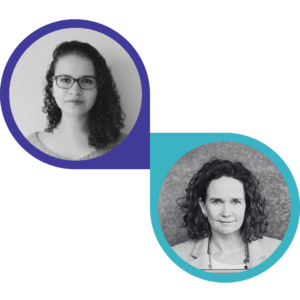
Hi, I’m Beatriz, the host of the inbetweenish pod, where I invite others to reflect on the meaning of belonging, the feeling of home, and I ask questions like, do you ever feel stuck between worlds?
And I’m Wiebke, from Chameleon Coaching. As an intercultural trainer and coach, I am passionate about supporting and empowering individuals on their journeys across cultures.
Stories of Belonging
Tune into Beatriz’ podcast where she invites inspiring and diverse CCKs to a deep and heartfelt conversation. Discover new perspectives and learn from their stories around identity struggles as well as their quest for belonging and defining where home is.

Explore your multicultural identity with me
I have supported many CCKs and global nomads on their inner journey to more clarity about their multicultural identity. Let me help you embrace your inner diversity and find true belonging within yourself and with others.

